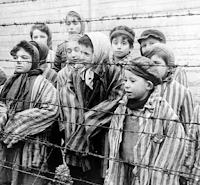From the Nazi atrocities to contemporary proposals that echo their chilling intent, concentration camps represent a deliberate stripping away of humanity, a policy rooted in fear, supremacy, and exclusion.
On Monday, the Guardian reported:
Military ordered to turn ruins of Rafah into ‘humanitarian city’ but experts call the plan an internment camp for all Palestinians in Gaza
Israel’s defence minister has laid out plans to force all Palestinians in Gaza into a camp on the ruins of Rafah, in a scheme that legal experts and academics described as a blueprint for crimes against humanity.
Israel Katz said he has ordered Israel’s military to prepare for establishing a camp, which he called a “humanitarian city”, on the ruins of the city of Rafah, Haaretz newspaper reported.
Palestinians would go through “security screening” before entering, and once inside would not be allowed to leave, Katz said at a briefing for Israeli journalists.
Israeli forces would control the perimeter of the site and initially “move” 600,000 Palestinians into the area – mostly people currently displaced in the al-Mawasi area.
Eventually the entire population of Gaza would be housed there, and Israel aims to implement “the emigration plan, which will happen”, Haaretz quoted him saying.
Since Donald Trump suggested at the start of the year that large numbers of Palestinians should leave Gaza to “clean out” the strip, Israeli politicians including the prime minister, Benjamin Netanyahu, have enthusiastically promoted forced deportation, often presenting it as a US project.
Katz’s scheme breaks international law, said Michael Sfard, one of Israel’s leading human rights lawyers. It also directly contradicted claims made hours earlier by the office of Israel’s military chief, which said in a letter that Palestinians were only displaced inside Gaza for their own protection.
Israel and the United States’ use of detention centres for genocide and mass deportations demand a fierce and unflinching critique. Historically, Nazi Germany’s concentration camps stand as a horrifying benchmark. Between 1933 and 1945, the Nazi regime operated over 44,000 camps and incarceration sites, imprisoning millions, including Jews, Romani people, political dissidents, and others deemed “undesirable.”
Approximately 1.65 million people were registered prisoners, with around one million perishing in camps like Auschwitz, Dachau, and Treblinka through starvation, forced labour, and gas chambers. These camps were not mere prisons but industrial-scale machines of death and oppression, designed to eradicate entire communities. Their legacy is a stark warning: when a state targets a group as “other,” the descent into barbarity is swift and catastrophic.
In 2025, Israel’s proposed “humanitarian city” in Gaza, as outlined by Defence Minister Israel Katz, bears a chilling resemblance to this dark history. The plan, reported by Haaretz and The Guardian, aims to confine 600,000 displaced Palestinians, eventually the entire 2.1 million population of Gaza, into a sealed-off area built on Rafah’s ruins. Palestinians would face “security screenings” and be barred from leaving, with the stated goal of “voluntary emigration” that critics, including former Prime Minister Ehud Olmert, label as ethnic cleansing.
Legal scholars like Michael Sfard argue this violates international humanitarian law, specifically the Fourth Geneva Convention’s prohibition on forced transfers. The plan’s language of “humanitarian” aid masks a reality of mass detention and starvation, with 758 Palestinians already murdered and over 5,000 injured at aid distribution centres since May 2025. Such policies echo the Nazi tactic of disguising genocidal intent as “resettlement,” a comparison that, while sensitive, is grounded in the mechanics of control and displacement.
So, anyone who doesn’t go to the concentration camp will be “eliminated.”
— Assal Rad (@AssalRad) July 10, 2025
Doesn’t sound genocidal at all… pic.twitter.com/mvuLIENeRm
In Libya, UN reports estimate 20,000 migrants are held in detention centres, often subjected to torture and extortion, with 3,000 deaths recorded in 2024 alone. These global examples mirror the dehumanising logic of historical concentration camps, using euphemisms like “processing” or “re-education” to sanitise systemic cruelty.
Across the Atlantic, the United States under the Trump administration is reviving its own form of detention horror. Reports from Reuters and the New York Times reveal plans to use military bases like Fort Bliss to detain up to 10,000 migrants, with ambitions to scale this to hundreds of thousands as part of the largest deportation operation in U.S. history. Currently, Immigration and Customs Enforcement (ICE) holds 41,000 people in for-profit facilities, with Guantánamo Bay recently reactivated for indefinite detention.
These centres, often compared to concentration camps by scholars and activists like Alexandria Ocasio-Cortez, mirror the internment of 120,000 Japanese Americans during World War II. The rhetoric of “invasion” and dehumanising terms like “animals” used by Trump is no laughing matter, and recalls Nazi propaganda, fostering indifference to the suffering of detained families, including children who are routinely separated from their parents.
People are comparing Trump's Alligator Alcatraz detention centre to Hitler's concentration camps. But they're wrong! Just look, the roofs are a completely different colour. #uspoli #fascism pic.twitter.com/nBdwFlezf9
— Peter Murphy (@PeterWMurphy1) July 13, 2025
Israel’s occupation, America’s xenophobia, and the global detention regimes around the world must end, not through war but through political pressure, justice and a recognition of our shared humanity. To ignore this is to court the same indifference that enabled the Holocaust’s horrors. We must resist these atrosities, for history shows what results if nothing is done.




